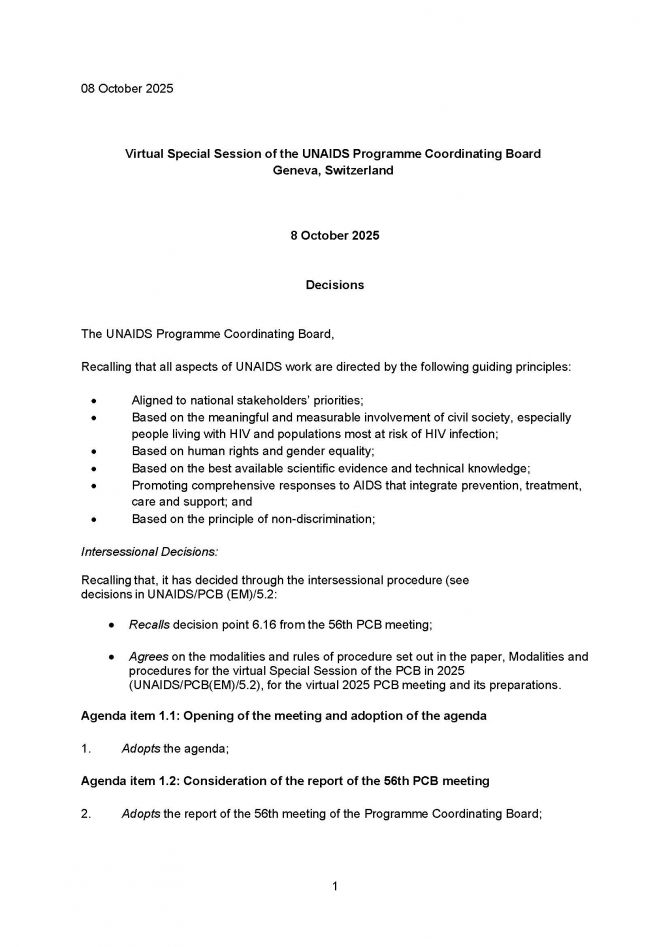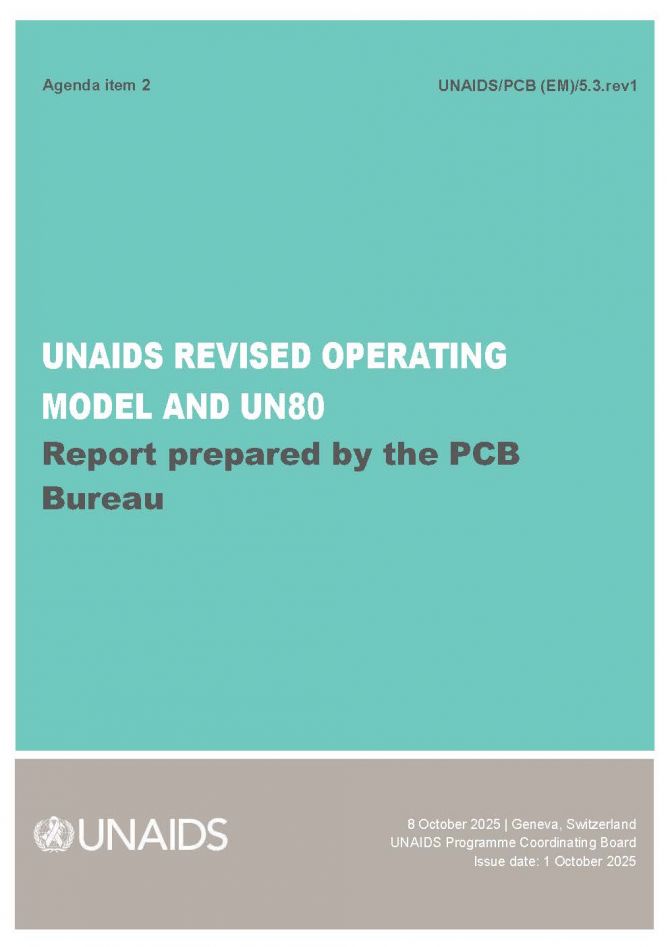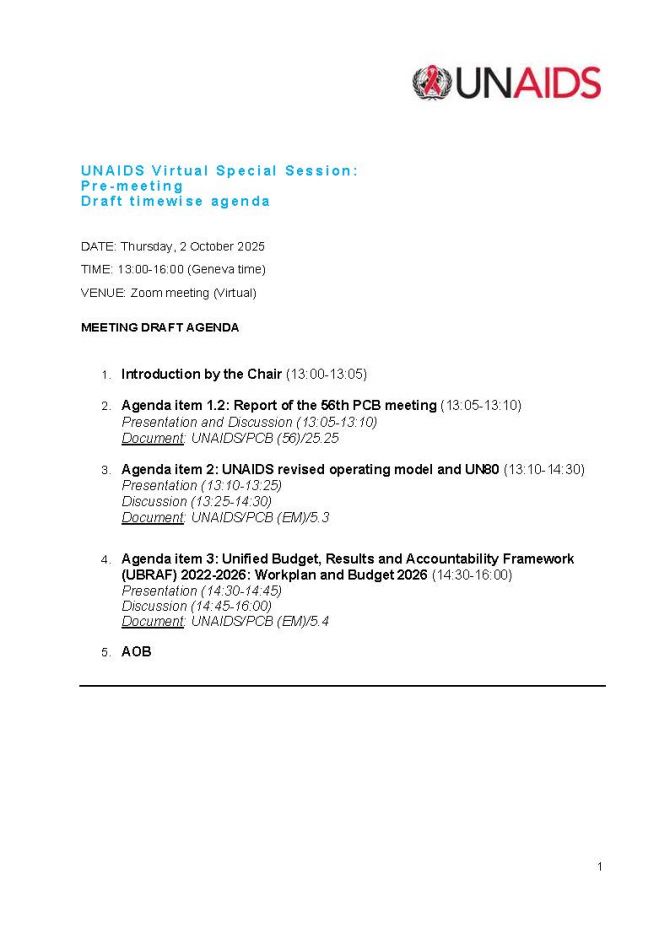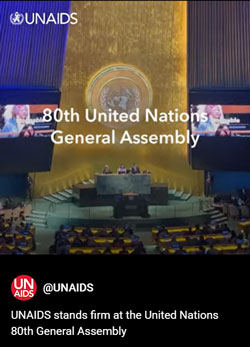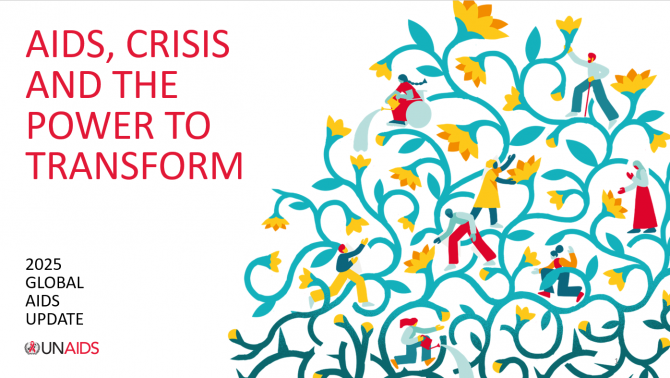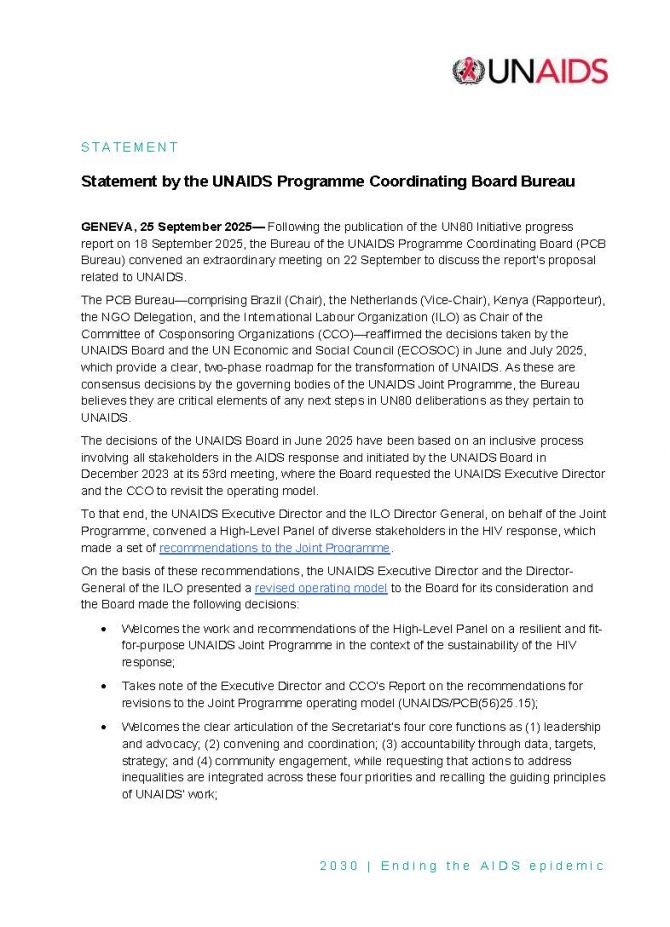
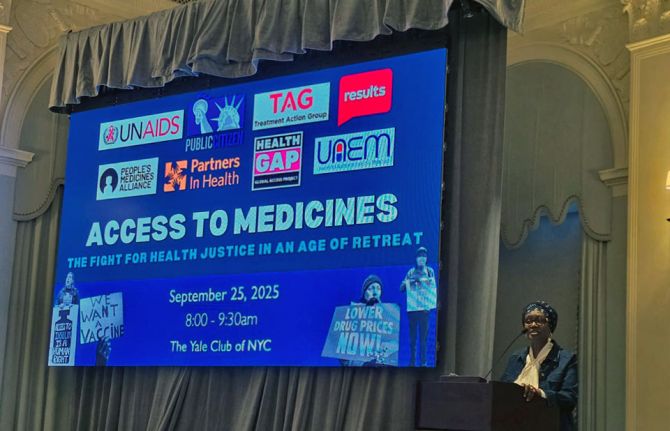
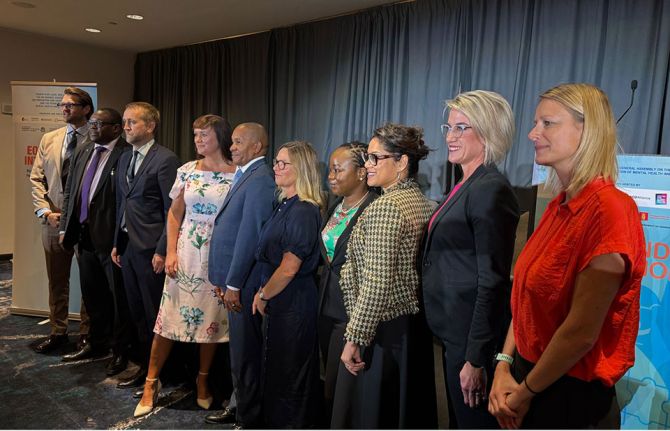
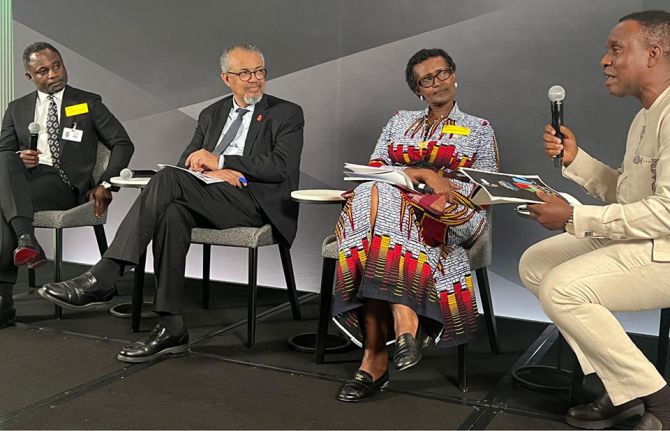

Press Release
UNAIDS stands firm at the United Nations 80th General Assembly
28 September 2025 28 September 2025GENEVA/NEW YORK, 27 September 2025—UNAIDS has wrapped up UNGA80 week with a productive mix of high-level events, announcements and decisions. The week kicked off with a face-to-face meeting of the esteemed members of the Global Council on Inequalities AIDS and Pandemics.
The group of experts, co-chaired by Nobel prize winning economist Joe Stiglitz, former First Lady of Namibia Monica Geingos, and Director of the Institute of Health Equity Sir Michael Marmot, met to review how inequality gaps within and between countries are impacting global health security.
Groundbreaking announcements were made on new deals to make generic versions of the long-acting injectable HIV prevention medicine, lenacapavir, available in 120 low- and middle-income countries at the price of just US$ 40 per person per year.
“This is a watershed moment in the fight to end AIDS as a public health threat. A price of $40 per person per year for a medicine which is almost 100% effective in preventing HIV with injections just twice a year is a leap forward that will help to unlock the revolutionary potential of long-acting HIV medicines,” said Winnie Byanyima, Executive Director of UNAIDS.
UNAIDS has been advocating for long-acting medicines to be affordable and available for people in most need since the studies were concluded. UNAIDS estimates that if 20 million people in highest need have access it would dramatically reduce new infections.
As part of these efforts and more, on the sidelines of UNGA80, UNAIDS and Africa Centres for Disease Control and Prevention signed a landmark memorandum of understanding to expand community health workforces, ensure access to quality and affordability HIV commodities, and strengthen Africa’s local manufacturing capacity of essential medicines to ensure sustainable HIV responses into the future.
UNAIDS is continuing to support countries including through active engagement in the Accra Reset, a pivotal initiative, launched by Ghanian President John Dramani Mahama at UNGA80, which introduces a bold framework that affirms Africa’s resolve to lead, own and sustain health systems. Ms Byanyima spoke at the launch saying, “We are here for health sovereignty, economic growth and a new era of African leadership. Getting there will require a whole-of-government, whole-of-society approach, empowering communities to lead.”
UNAIDS also launched a new short film featuring prominent global HIV advocates including Prince Harry, Duke of Sussex, Magic Johnson and Charlize Theron. In the film the advocates call on governments and donors to sustain life-saving investments to end AIDS, warning that hard-won progress against HIV is at risk of being reversed due to sudden and drastic funding cuts by donors.
UNAIDS participated in a number of events organized by the Nizami Ganjavi International Center (NGIC) as part of their High-level meeting on ‘Multilateralism on a Crossroads: Challenges and Pathways to Peace’.
“We may be in crisis, but we are not powerless,” said Ms Byanyima at the NGIC event on global health and pandemic preparedness. “We can break the inequality-pandemic-cycle. We can prepare for – and even prevent – the next pandemic. And we can take action to bring an end to ongoing pandemics like AIDS. As governments and leaders, there are tools you can use. I hope that you will.”
Just ahead of UNGA, two important reports were released, both with significant implications for the future of the AIDS response.
The first, a new US Strategy on Global Health, set out a tailored focus for the US to work closely with countries most affected by HIV and reaffirms the leadership from the US in the AIDS response and its continued commitment to saving lives through the US President's Emergency Plan For AIDS Relief.
The second, a progress report from the United Nations Secretary-General on structural reforms and programme realignments in which the Secretary-General puts forward a proposal to advance UNAIDS’ transformation timeline.
There was an outpouring of support for UNAIDS with around 900 organizations signing on to reaffirm UNAIDS current transformation plans. UNAIDS’ Board issued a statement reiterating that the governing bodies have the responsibility to determine the way forward.
UNAIDS has been working within the Secretary-General’s UN80 vision and has been advancing on its two-phase transition path, leading the way as the UN system reforms.
The first phase of transformation, currently underway, includes a 55% reduction in UNAIDS Secretariat staffing (from 661 to 294 staff). UNAIDS’ country presence is being consolidated from 85 to 54 countries, with a lighter footprint in 40 countries. Programmatic expertise is being relocated to regional hubs in Nairobi, Johannesburg and Bangkok and UNAIDS’ Geneva presence has been reduced by over 80%.
UNAIDS’ priority is to continue to support inclusive, multisectoral, and sustainable national HIV responses, led by governments and communities, and increasingly funded by domestic resources. AIDS is not over; the global AIDS response has been upended in recent months and much more needs to be done to achieve the SDG target of ending AIDS by 2030.
UNAIDS
The Joint United Nations Programme on HIV/AIDS (UNAIDS) leads and inspires the world to achieve its shared vision of zero new HIV infections, zero discrimination and zero AIDS-related deaths. UNAIDS unites the efforts of 11 UN organizations—UNHCR, UNICEF, WFP, UNDP, UNFPA, UNODC, UN Women, ILO, UNESCO, WHO and the World Bank—and works closely with global and national partners towards ending the AIDS epidemic by 2030 as part of the Sustainable Development Goals. Learn more at unaids.org and connect with us on Facebook, Twitter, Instagram and YouTube.


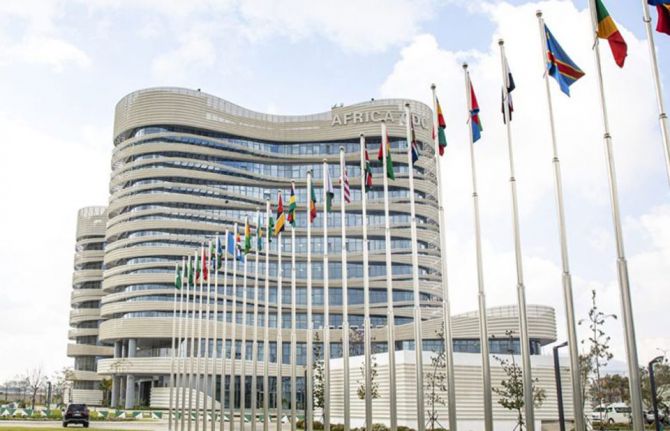
Press Statement
UNAIDS and Africa Centres for Disease Control and Prevention sign landmark agreement to strengthen community health systems and epidemic preparedness across Africa
26 September 2025 26 September 2025NEW YORK, 26 September 2025—UNAIDS and the Africa Centres for Disease Control and Prevention (Africa CDC) have today signed a Memorandum of Understanding (MoU) on the sidelines of the United Nations General Assembly to deepen collaboration in advancing Africa’s health security, strengthening community health systems, and ensuring sustainable HIV responses.
“UNAIDS has a major role to play. We are signing this MoU to send a strong message that Africa supports UNAIDS,” said Dr. Jean Kaseya, Director-General of Africa CDC. “HIV is still a major public health issue in Africa. Africa CDC is a proud partner of UNAIDS.”
“By joining forces, we can strengthen community health workforces, advance local manufacturing, and secure sustainable financing for HIV and broader health services,” said Winnie Byanyima, Executive Director of UNAIDS. “Together, we are laying the foundation for healthier, more equitable societies across Africa. This MoU is about UNAIDS supporting Africa CDC to build its own feet on the ground and build capacity in the institution to take over and support countries.”
The agreement establishes a framework for joint action in areas of mutual interest, including:
- Expanding community health workforces: Supporting the African Union’s 2017 Heads of State mandate on the 2 Million Community Health Worker Initiative through training, reskilling, and deployment of polyvalent community health workers in hard-to-reach rural and emergency settings, with targeted outreach to populations most at risk of being left behind.
- Bolstering epidemic and pandemic preparedness: Leveraging UNAIDS’ data and technical platforms with Africa CDC’s regulatory networks to ensure access to, quality and affordability of HIV commodities, while strengthening Africa’s local manufacturing capacity of essential medicines and driving advocacy for technology transfer.
- Ensuring sustainable HIV responses: Supporting African Union Member States to develop and implement sustainability and transition plans embedded in national health financing strategies. This includes expanding domestic revenue mobilization, integrating HIV services into primary health care and national insurance schemes, and exploring diversified funding instruments such as debt relief mechanisms and blended financing.
- Joint project development and resource mobilization: Designing collaborative programmes aligned with the mandates of both institutions, mobilizing resources from partners, and extending technical expertise through staff secondments where beneficial.
The signing of the MoU reflects a shared commitment by UNAIDS and Africa CDC to drive progress towards the achievement of the Sustainable Development Goals, and the vision of a healthier, more resilient continent.
UNAIDS
The Joint United Nations Programme on HIV/AIDS (UNAIDS) leads and inspires the world to achieve its shared vision of zero new HIV infections, zero discrimination and zero AIDS-related deaths. UNAIDS unites the efforts of 11 UN organizations—UNHCR, UNICEF, WFP, UNDP, UNFPA, UNODC, UN Women, ILO, UNESCO, WHO and the World Bank—and works closely with global and national partners towards ending the AIDS epidemic by 2030 as part of the Sustainable Development Goals. Learn more at unaids.org and connect with us on Facebook, Twitter, Instagram and YouTube.

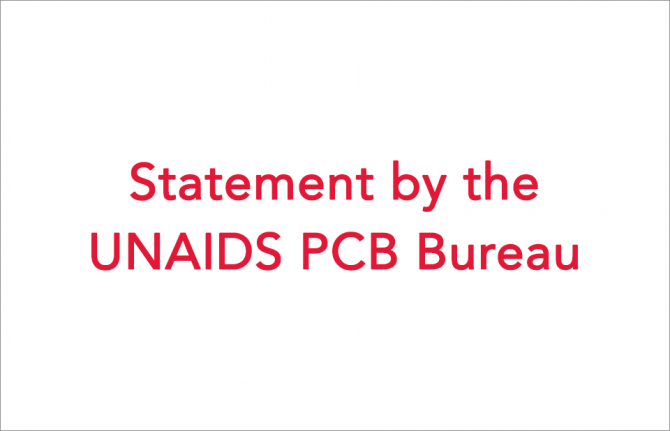
Feature Story
Statement by the UNAIDS Programme Coordinating Board Bureau
25 September 2025
25 September 2025 25 September 2025GENEVA, 25 September 2025— Following the publication of the UN80 Initiative progress report on 18 September 2025, the Bureau of the UNAIDS Programme Coordinating Board (PCB Bureau) convened an extraordinary meeting on 22 September to discuss the report’s proposal related to UNAIDS.
The PCB Bureau—comprising Brazil (Chair), the Netherlands (Vice-Chair), Kenya (Rapporteur), the NGO Delegation, and the International Labour Organization (ILO) as Chair of the Committee of Cosponsoring Organizations (CCO)—reaffirmed the decisions taken by the UNAIDS Board and the UN Economic and Social Council (ECOSOC) in June and July 2025, which provide a clear, two-phase roadmap for the transformation of UNAIDS. As these are consensus decisions by the governing bodies of the UNAIDS Joint Programme, the Bureau believes they are critical elements of any next steps in UN80 deliberations as they pertain to UNAIDS.
The decisions of the UNAIDS Board in June 2025 have been based on an inclusive process involving all stakeholders in the AIDS response and initiated by the UNAIDS Board in December 2023 at its 53rd meeting, where the Board requested the UNAIDS Executive Director and the CCO to revisit the operating model.
To that end, the UNAIDS Executive Director and the ILO Director General, on behalf of the Joint Programme, convened a High-Level Panel of diverse stakeholders in the HIV response, which made a set of recommendations to the Joint Programme.
On the basis of these recommendations, the UNAIDS Executive Director and the Director-General of the ILO presented a revised operating model to the Board for its consideration and the Board made the following decisions:
- Welcomes the work and recommendations of the High-Level Panel on a resilient and fit-for-purpose UNAIDS Joint Programme in the context of the sustainability of the HIV response;
- Takes note of the Executive Director and CCO’s Report on the recommendations for revisions to the Joint Programme operating model (UNAIDS/PCB(56)25.15);
- Welcomes the clear articulation of the Secretariat’s four core functions as (1) leadership and advocacy; (2) convening and coordination; (3) accountability through data, targets, strategy; and (4) community engagement, while requesting that actions to address inequalities are integrated across these four priorities and recalling the guiding principles of UNAIDS’ work;
- Endorses the revised operating model of the Joint Programme, as set out in this report (UNAIDS/PCB(56)25.15), noting that additional decisions will be taken on the operating model at the Special Session of the PCB in October 2025 and subsequent PCB meetings in line with future decisions of the UN80 Initiative.
- Requests the Executive Director to provide regular updates on the operationalization of the revised operating model starting at the 57th PCB meeting in December 2025;
- Requests the Executive Director, to define a review process of the revised operating model by the 57th PCB in December 2025, in consultation with the Cosponsors and PCB stakeholders, and undertake that review by June 2027 at the latest to inform the PCB’s decision making, subject to ECOSOC decisions, on the further transition of the Joint Programme within the wider UN system to sustain global progress towards ending AIDS as a public health threat.
In July, these decisions were formally noted by ECOSOC in consensus Resolution E/RES/2025/20 on the Joint Programme (https://docs.un.org/en/E/RES/2025/20).
During its discussions on 22 September, Bureau members highlighted the importance of protecting the integrity of the reform process underway and avoiding further disruption to the HIV response, expressing concern that the UN80 progress report did not reflect the recent Board and ECOSOC decisions, leading to confusion among stakeholders, particularly civil society and donors.
The Bureau recalled that the proposals in the UN80 report are non-binding and that it is the responsibility of the governing bodies to determine the way forward, as emphasized by the Secretary-General. In this context, the Bureau has added an agenda item on implementation of the UNAIDS revised operating model and UN80 to the Special Session of the PCB on 8 October 2025, before the UNAIDS Board considers the 2026 Workplan and Budget.
The PCB Bureau acknowledges UNAIDS' commitment to a transparent, inclusive and responsible transformation, adhering to the decisions of its governing bodies, aligned with the broader objectives of UN80 reform and towards achieving the goal of ending AIDS as a public health threat by 2030.

